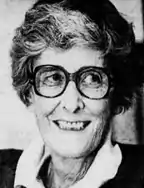Kate Peck Kent
Kate Peck Kent (1914 – October 28, 1987), born Kate Stott Peck, was an American anthropologist who studied the history of Pueblo and Navajo textiles.
Kate Peck Kent | |
|---|---|
 Kate Peck Kent, from a 1987 publication. | |
| Born | Kate Stott Peck 1914 Washington, D.C. |
| Died | October 28, 1987 El Rito, New Mexico |
| Occupation | Anthropologist |
Early life and education
Kate Stott Peck was born in Washington, D.C. in 1914, and raised in Denver, the daughter of Allen Steele Peck and Jessie Peck.[1][2] Her father was an officer in the U. S. Forest Service.[3][4]
Peck earned a bachelor's degree from the University of Denver, and pursued graduate studies at Columbia University.[5][6][7] She completed a master's degree at the University of Arizona in 1949, with a thesis titled "An analysis and interpretation of the cotton textiles from Tonto National Monument."[8] In retirement, she continued her studies at the School of American Research in Santa Fe, New Mexico.[9]
Career
In the late 1930s, Kent was assistant to curator Frederic Huntington Douglas at the Denver Art Museum.[10][11] She taught anthropology at Barnard College and the University of Denver,[8] and was senior research associate at the Museum of International Folk Art.[9] After she retired from the University of Denver in 1976, she was an adjunct professor at the University of New Mexico.[9] She also served as an officer of the Southwestern Association of Indian Affairs.[12]
She wrote a short book, The Story of Navajo Weaving (1961), for the Heard Museum in Phoenix, Arizona.[13] Kent's later books were Prehistoric Textiles of the Southwest (1983),[14] Pueblo Indian Textiles: A Living Traditions (1983),[15] and Navajo Weaving: Three Centuries of Change (1985). "I'll bet there's not one archaeologist who's read my books," she said in a 1987 interview. "But weavers love my books. They are my most loyal supporters. I've talked to a lot of weavers' guilds and given workshops prehistoric techniques. Weavers love to experiment."[11] Hopi weaver Ramona Sakiestewa was inspired by Kent's work to explore historical techniques for her Ancient Blanket Series.[16]
She wrote an introduction to H. P. Mera's rediscovered Spanish American Blanketry (1984).[17] She contributed an essay on Southwestern weaving to I Am Here (1989), a book published to mark the opening of the Museum of Indian Arts and Culture in Santa Fe, New Mexico.[18]
Personal life and legacy
In 1937,[1] Kate Peck married educator Arthur Tufnell Sabine Kent.[19] They had three children, Hilary, Stephen, and Jonathan.[6] Kate Peck Kent died in 1987, aged 73 years, at her home in El Rito, New Mexico.[20][21]
In 1988, the Wheelwright Museum of the American Indian held a memorial exhibit, "Living Traditions: Kate Peck Kent and the Study of Historic Pueblo Textiles".[22] Her papers and library were donated to the Wheelwright Museum after her death.[23]
References
- "MISS KATE S. PECK ENGAGED TO MARRY; Parents of Denver Girl Have Announced Betrothal to Arthur T.S. Kent". The New York Times. 1937-12-30. ISSN 0362-4331. Retrieved 2020-08-01.
- "Col. Allen S. Peck Services Wednesday". The Daily Sentinel. 1951-02-06. p. 3. Retrieved 2020-08-01 – via Newspapers.com.
- "Allen Steele Peck '05". The Michigan Alumnus. 38: 331. February 6, 1932.
- "Region Forest Head Retires After 40 Years". The Daily Sentinel. 1943-11-28. p. 8. Retrieved 2020-08-01 – via Newspapers.com.
- "Mrs. Kate Peck Kent Studies Americans of 1,000 Years Ago". Arizona Daily Star. 1945-09-14. p. 8. Retrieved 2020-08-01 – via Newspapers.com.
- "Kate Stott Peck Kent". The Santa Fe New Mexican. 1987-10-30. p. 9. Retrieved 2020-08-01 – via Newspapers.com.
- "Obituary for Kate Stott Peck Peck (Aged 73)". Rio Grande Sun. 1987-11-05. p. 22. Retrieved 2020-08-01 – via Newspapers.com.
- Browman, David L. (2020-02-17). Cultural Negotiations: The Role of Women in the Founding of Americanist Archaeology. U of Nebraska Press. ISBN 978-1-4962-1044-9.
- Ireland, Tom (1983-06-24). "Retirement a busy time for author of textile books". The Santa Fe New Mexican. p. 50. Retrieved 2020-08-01 – via Newspapers.com.
- "Mrs. Kate Peck Kent to Speak at Museum". Tucson Daily Citizen. 1945-10-15. p. 2. Retrieved 2020-08-01 – via Newspapers.com.
- Zoretich, Frank (1987-10-06). "Daughters of the Desert". Albuquerque Journal Magazine. pp. 40–44. Retrieved 2020-08-01 – via Newspapers.com.
- "Indian Group Picks Officers". The Santa Fe New Mexican. 1982-11-21. p. 17. Retrieved 2020-08-01 – via Newspapers.com.
- D. F. B. (1961-11-12). "Literary Lantern". Arizona Daily Star. p. 40. Retrieved 2020-08-01 – via Newspapers.com.
- Kent, Kate Peck (1983). Prehistoric Textiles of the Southwest. School of American Research. ISBN 978-0-8263-0591-6.
- Traugott, Joseph (1983-12-18). "Book Saves Pueblo Weaving History". Albuquerque Journal. p. 34. Retrieved 2020-08-01 – via Newspapers.com.
- Sandrin, Kathleen (1994-12-16). "Adding a Twist to Story of Pendleton Blankets". The Santa Fe New Mexican. p. 82. Retrieved 2020-08-01 – via Newspapers.com.
- "Looking at Culture Through the Eyes of a 'Carpintero'". The Santa Fe New Mexican. 1987-12-18. p. 51. Retrieved 2020-08-01 – via Newspapers.com.
- Best, Jan (1989-09-22). "A Treasure of Southwestern Artifacts". The Santa Fe New Mexican. p. 41. Retrieved 2020-08-01 – via Newspapers.com.
- "Arthur T. S. Kent". Rio Grande Sun. 1991-12-12. p. 32. Retrieved 2020-08-01 – via Newspapers.com.
- Spencer, Anne M. (1989). "The Legacy of Kate Peck Kent: A Museum Curator's View". Museum Anthropology. 13 (2): 7–8. doi:10.1525/mua.1989.13.2.7. ISSN 1548-1379.
- Whiteford, Andrew Hunter (1988). "Kate Peck Kent (1914–1987)". American Anthropologist. 90 (4): 956–957. doi:10.1525/aa.1988.90.4.02a00150. ISSN 1548-1433.
- "Gallery Shows". The Santa Fe Reporter. 1988-01-06. p. 14. Retrieved 2020-08-01 – via Newspapers.com.
- "Exhibitions: Pueblo Indian Embroidery from the Kate Peck Kent Memorial Collection". Wheelwright Museum of the American Indian. 2008. Retrieved 2020-08-01.